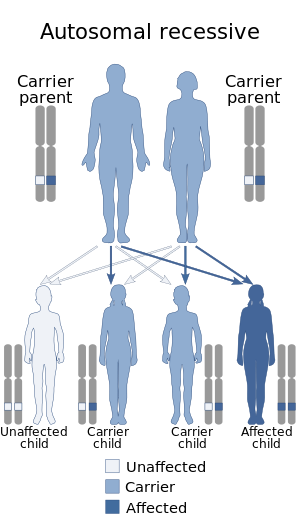Nakajo syndrome
| Nakajo syndrome | |
|---|---|
| Other names | Nodular erythema with digital changes, Amyotrophy-fat tissue anomaly syndrome, Secondary hypertrophic osteoperiostosis with pernio |
 | |
| Nakajo syndrome has an autosomal recessive pattern of inheritance. | |
| Specialty | Medical genetics |
Nakajo syndrome, also called nodular erythema with digital changes,[1] is a rare autosomal recessive congenital disorder first reported in 1939 by A. Nakajo in the offspring of consanguineous (blood relative) parents.[2][3] The syndrome can be characterized by erythema (reddened skin), loss of body fat in the upper part of the body, and disproportionately large eyes, ears, nose, lips, and fingers.[1]
Genetics[]
Nakajo syndrome is inherited in an autosomal recessive manner.[3] This means the defective gene responsible for the disorder is located on an autosome, and two copies of the defective gene (one inherited from each parent) are required in order to be born with the disorder. The parents of an individual with an autosomal recessive disorder both carry one copy of the defective gene, but usually do not experience any signs or symptoms of the disorder.[citation needed]
Diagnosis[]
This section is empty. You can help by . (August 2017) |
Treatment[]
This section is empty. You can help by . (August 2017) |
References[]
- ^ Jump up to: a b Online Mendelian Inheritance in Man (OMIM): Nakajo syndrome - 256040
- ^ Nakajo A (1939). "Secondary hypertrophic osteoperiostosis with pernio". J Derm Venerol. (in Japanese). 45: 77–86.
- ^ Jump up to: a b Kitano Y, M. E. (August 1985). "A syndrome with nodular erythema, elongated and thickened fingers, and emaciation". Archives of Dermatology. 121 (8): 1053–1056. doi:10.1001/archderm.121.8.1053. PMID 4026345.
External links[]
| Classification | |
|---|---|
| External resources |
- Autosomal recessive disorders
- Congenital disorders
- Rare diseases
- Syndromes
- Genetic disorders with OMIM but no gene
- Genetic disorder stubs